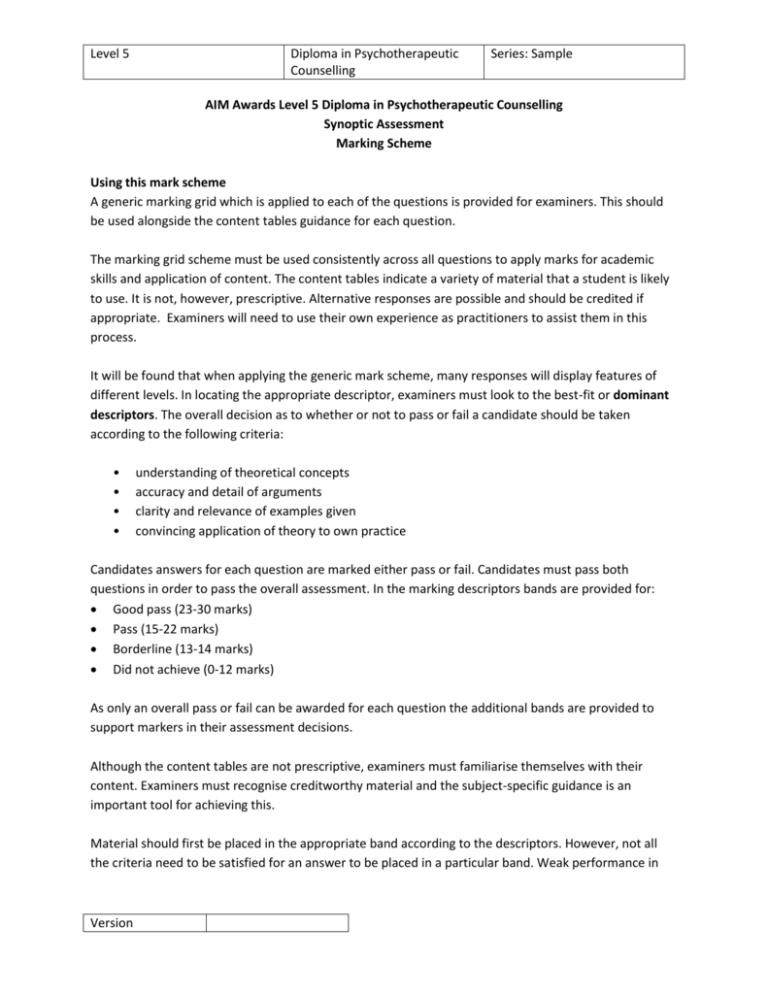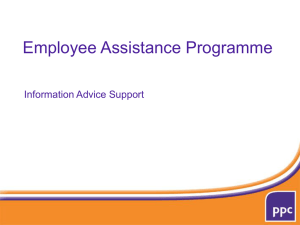Sample Level 5 Diploma in Psychotherapeutic
advertisement

Level 5 Diploma in Psychotherapeutic Counselling Series: Sample AIM Awards Level 5 Diploma in Psychotherapeutic Counselling Synoptic Assessment Marking Scheme Using this mark scheme A generic marking grid which is applied to each of the questions is provided for examiners. This should be used alongside the content tables guidance for each question. The marking grid scheme must be used consistently across all questions to apply marks for academic skills and application of content. The content tables indicate a variety of material that a student is likely to use. It is not, however, prescriptive. Alternative responses are possible and should be credited if appropriate. Examiners will need to use their own experience as practitioners to assist them in this process. It will be found that when applying the generic mark scheme, many responses will display features of different levels. In locating the appropriate descriptor, examiners must look to the best-fit or dominant descriptors. The overall decision as to whether or not to pass or fail a candidate should be taken according to the following criteria: • • • • understanding of theoretical concepts accuracy and detail of arguments clarity and relevance of examples given convincing application of theory to own practice Candidates answers for each question are marked either pass or fail. Candidates must pass both questions in order to pass the overall assessment. In the marking descriptors bands are provided for: Good pass (23-30 marks) Pass (15-22 marks) Borderline (13-14 marks) Did not achieve (0-12 marks) As only an overall pass or fail can be awarded for each question the additional bands are provided to support markers in their assessment decisions. Although the content tables are not prescriptive, examiners must familiarise themselves with their content. Examiners must recognise creditworthy material and the subject-specific guidance is an important tool for achieving this. Material should first be placed in the appropriate band according to the descriptors. However, not all the criteria need to be satisfied for an answer to be placed in a particular band. Weak performance in Version Level 5 Diploma in Psychotherapeutic Counselling Series: Sample one area may be compensated for by strong performance in others. In order to access the top band, issues, debates and/or approaches need to be addressed effectively. Generic Marking Grid Good Pass (23-30 marks) Pass (15-22 marks) Borderline (13-14 marks) Did not achieve (0-12 marks) Version Academic Skills Evaluation demonstrates sound analysis, understanding and interpretation. The answer is well focused and shows coherent elaboration and/or a well formed argument. Issues/debates/approaches are used effectively. Ideas are well structured and expressed clearly and fluently. Consistently effective use of counselling terminology. Evaluation demonstrates reasonable analysis and understanding. The answer is generally focused and shows reasonable elaboration and/or clear line of argument is evident. Issues/debates/approaches are used in a reasonably effective manner. Most ideas appropriately structured and expressed clearly. Appropriate use of counselling terminology. Evaluation demonstrates basic, superficial understanding. The answer is sometimes focused and shows some evidence of elaboration. Superficial reference may be made to issues/debates/approaches. Expression of ideas lacks clarity. Limited use of counselling terminology Evaluation is rudimentary, demonstrating a very limited understanding. The answer is weak, muddled and incomplete. Material is not used effectively and may be mainly irrelevant. If reference is made to issues/debates/approaches, it is muddled and inaccurate. Deficiency in expression of ideas results in confusion and ambiguity. The answer lacks structure, often merely a series of unconnected assertions. Application of Content Content is evaluated in relation to own practice. (See content table below in relation to question being marked) Content is analysed with some reference to own practice (See content table below in relation to question being marked) Content is mentioned and discussed. (See content table below in relation to question being marked) Content is not mentioned or referenced incorrectly (See content table below in relation to question being marked) Level 5 Diploma in Psychotherapeutic Counselling Series: Sample Content Table Question 1 – Option 1 A counselling supervisor should not also be your line manager, trainer or personal therapist, however in practice, this may not always be the case. Give an account of your understanding of this principle and its implications for practice. Describe how relevant this has been for you within your own experience of supervision. Related unit content Counselling Ethical Framework or Code of Ethics Supervision, Dual Relationships in Counselling Supervision Ethical and Legal Multiple professional roles Issues Line manager may have responsibility for hiring/firing, performance review, LO.1 case allocation LO.2 Trainer may be involved in assessment pass/fail decisions Personal therapist has client’s interests at heart, not supervisee’s clients’ interests Task of Supervision becomes blurred Relation to the Supervision Contract Implications for Practice More benefits or more harm where client is concerned Expectation of supervisee from supervisor in managing multiple professional roles acknowledgement of power differential and evaluative roles, maintenance of objectivity, assessment of potential for harm keeping of clear boundaries, open discussion of issue with supervisee. awareness as an important component in avoiding harm Version Level 5 Diploma in Psychotherapeutic Counselling Series: Sample Content Table Question 1 – Option 2 Use examples to discuss the difference between an ethical requirement and a legal requirement, which might arise in counselling practice. Relate your examples to your own experience of client work. Related unit content Counselling Ethical Framework or Code of Ethics Practicum Ethical requirements as prescriptive/advisory/guidance for decision making LO.1 Implications for professional status LO.2 Legal requirements as proscriptive/compulsory/potentially even more serious LO.3 consequences Difference between civil and criminal law Examples of ethical requirements Respect/autonomy/consent Confidentiality Contracting Competence Dual relationships Research Self-care and CPD Examples of legal requirements Contracting Obtaining informed consent for counselling ( partic when working with C&YP – [Gillick Competence] or vulnerable adults [Mental Capacity Act 2005] Duty of care Liability Risk: o Self-harm/suicide/investigation of abuse/ terrorism/drug dealing o Access to records Version Level 5 Diploma in Psychotherapeutic Counselling Series: Sample Content Table Question 1 – Option 3 Give two examples of reporting requirements, which could place a legal obligation on a counsellor to breach client confidentiality. Discuss how you would manage the situation if a similar example arose in your own practice. Related unit content Examples of mandatory reporting requirements Counselling Practicum LO.1 Terrorism Act 2000/Terrorism , Crime and Security Act 2001 LO.2 Drug Trafficking Act 1994 LO.3 Children Act 2004 [specifically co-operating with an investigation by Social Services into suspected Child Abuse] Other similar examples/issues Children Act 2004 (complex area- not straightforwardly mandatory but moral or ethical duty ‘ the welfare of the child is paramount’) Social services/NSPCC Suicidal clients ( welfare of C YP ( law weighted to preserve life for U18s and mental capacity for adults ( law weighted towards an individual’s autonomy) Contractual obligation to employer (conflict with professional/ethical duty?) Requirements of multi-disciplinary/statutory settings Implications for practice Use Ethical Framework/Code of Ethics Use supervision Check insurance Take legal advice Version Level 5 Diploma in Psychotherapeutic Counselling Series: Sample Content Table Question 2 It has been argued that much of the research being done into the effectiveness of counselling fails to reflect the complexities of actual work with clients. Give an account of your own understanding of this statement, relating to your own experience of research and client work. Related unit content Research in Emphasis on evidence based practice Counselling Ignorance/minimisation of practice based evidence LO.1 Dependence on statistical generalizations LO.3 Lack of evidence that research outcomes benefit clients LO.4 Concerns re confidentiality Standardised questionnaires do not match client’s experience? Randomized Controlled Trials CORE system NICE recommendations Qualitative/quantitative methods Working Alliance Inventory Systematic use of Case Studies Distribution of marks: Question 1 Marks 30 2 Total 30 60 Unit content covered Counselling Supervision, Ethical and Legal Issues LO.1, LO.2 Counselling Practicum LO.1, LO.2, LO.3 Research in Counselling LO.1, LO.3, LO.4 Weighting 50% 50% This assessment is designed to assess aspects of the units covered by the this synoptic assessment listed. Writers will ensure elements from all units are included from across the exam paper. Unit specifications can be found through the following links Unit Reference Number Unit Title D/506/3058 Counselling Practicum T/506/3129 Counselling Supervision, Ethical and Legal Issues K/506/3130 Research in Counselling Version Level 5 Diploma in Psychotherapeutic Counselling Series: Sample The qualification specification contains full information on the qualification. Version






